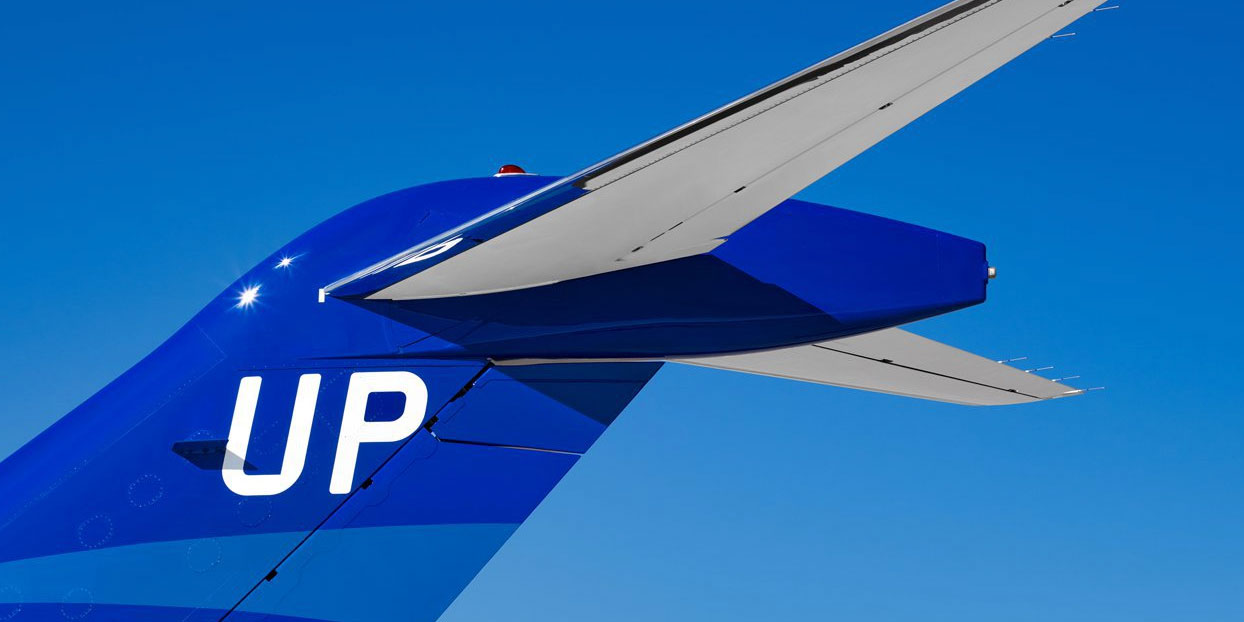|
Wheels Up Experience's fourth-quarter revenue decreased by $162 million year-over-year, to $246 million, but the company did stem its losses by 64 percent, the company said this morning during an earnings call. "We made significant progress over the past quarter to improve our business for a sustainable future," said CFO Todd Smith. "We are continuing to optimize our cost structure and fleet to focus on profitability. With improving liquidity in the fourth quarter and our partnership with Delta, we believe we are well positioned to continue to invest in our business for the long term." Meanwhile, the company reported that flight-related revenue for the full year rose 30 percent, to $1.2 billion. Wheels Up said it is hoping to increase profitability via a higher mix of charter and corporate flying, cost reductions, stabilization of its deferred revenue balance, and normalization of working capital. The earnings call comes after Delta led a consortium of investors to rescue it from reported financial troubles in the third quarter. That consortium now owns more than 90 percent of Wheels Up. In a financial filing last year, the air charter company reported a working capital deficit of $720.8 million. Delta previously owned a minority stake in the company. |
|
|
Global business aircraft flight activity for the first two months of this year was down about 3 percent from the same period a year ago, according to the latest data from WingX. The data analytics company’s CEO, Richard Koe, told attendees today at the annual British Business & General Aviation Association conference that Europe is generally lagging behind North America as the continent's main economies endure weak growth and continued fallout from Russia’s war with Ukraine. During 2023, when Koe described industry activity as "simmering" after the exceptional post-Covid performance in 2022, WingX recorded stronger traffic growth rates in Asia (up 28 percent), Africa (up 26 percent), and Latin America (up 16 percent). However, these regions collectively still account for less than 10 percent of global business aviation activity. While traffic levels declined last year in Europe (down 7 percent) and North America (down 4 percent), Koe indicated that the latter region appears to have stronger prospects for 2024. “Europe has now fallen back to 2019 levels of activity and has not sustained the step change seen elsewhere after the pandemic,” he commented. In the two years since Russia invaded Ukraine, WingX has recorded a 16 percent decline in activity directly attributable to fallout from economic sanctions against individuals and institutions associated with the Putin administration. |
|
|
Business aircraft operators and general aviation airports will have to adapt to new UK border control processes resulting from the implementation of the country’s Electronic Travel Authorization (ETA) requirements. The program is being gradually implemented following its launch in November and is expected to be extended to include European Union, U.S., and Canadian citizens by early next year. Addressing the British Business and General Aviation Association conference in London today, Nigel Farminer, deputy director of passenger policy and border transformation with the UK Border Force, said the implementation of ETA is being gradually expanded. For now, it applies only to citizens of the Gulf Cooperation Council states and Jordan and is not being fully enforced if travelers have not completed the process. ETA clearances—which will be valid for two years or until a passport expires—cover multiple trips to the UK. The responsibility for ensuring passengers hold the approval to travel to the UK will lie with aircraft operators, and Farminer said they will need to adjust the way they submit passenger information. In October, the European Union will implement its new Entry-Exit System for non-EU citizens. This will involve fingerprint and facial scanning checks that will require travelers to complete an in-person enrollment process on their first visit to an EU state after the system takes effect. |
|
|
Stevens Aerospace and Defense Systems will acquire Mayo Aviation’s MRO operations at Denver Centennial Airport (KAPA) as part of an agreement that will expand Mayo’s aircraft maintenance capabilities for its managed aircraft and charter customers. “This allows us to better focus on our aircraft owners and charter services while offering a national MRO partnership to our customers, giving them more options, capabilities, and expertise,” said Mayo Aviation president Brent Moldowan. “Stevens offers a robust maintenance provider plan nationwide for our owners, with a proven track record.” Mayo Aviation serves as the Rocky Mountain West base of the George J. Priester Aviation family of companies. Last year, Stevens acquired the maintenance operations of Hill Private Aviation, Priester’s Southeast base. This latest alliance offers Priester customers more access to MRO capabilities for all aircraft types and gives Mayo customers more benefits such as preferential maintenance scheduling. With this addition, Stevens now operates four main bases: Greenville, South Carolina; Atlanta; Denver; and Nashville, Tennessee. It also has an extensive mobile maintenance division. “Stevens’ legacy as a privately owned aviation company aligns with the values of all of our companies,” Moldowan said. “They understand that aviation is a service business and share the same focus on customers. Partnering with such an established, similar-minded company allows Mayo to best serve our owners’ needs and benefit charter clients.” |
|
|
By a 339 to 85 vote, the U.S. House of Representatives yesterday passed the full fiscal year 2024 funding package for the first tranche of government agencies, including a $20.28 billion budget for the FAA. House action follows approval late last week of another short-term funding extension, this time until March 8 for the first group of agencies, narrowly averting a shutdown that was set to occur on March 1. The federal government, including the FAA, has been operating under a series of funding extensions since FY2024 began on October 1. In addition, the FAA has been operating under a series of extensions of its authorization as Congress finalizes a long-term reauthorization bill. As for the appropriations bill, Congress is providing a $1.25 billion increase over FY2023, including funding for the hiring of 1,800 air traffic controllers. In all, the bill would provide $12.73 billion for the agency’s operations budget, including funding to improve the notam system and oversight of production and manufacturing. The appropriations package directs the Flight Standards Service to reduce its backlog of certification applications and calls for a report within 90 days on the staffing allocated to Part 135 applications. Congress also provided $3.43 billion for FAA facilities and equipment, and the Airport Improvement Program would receive $3.85 billion. Research, engineering, and development, meanwhile, is budgeted for $280 million. |
|
|
Signature Aviation is teaming up with Beta Technologies to bring electric aircraft chargers to its FBOs across the U.S. East Coast. The business aviation services group inaugurated its first Beta charging station today at Manchester-Boston Regional Airport (KMHT) in New Hampshire. The partners signed an agreement covering the installation of charging stations at three Signature locations, with discussions for additional locations already underway. In the third quarter, Beta will install another two chargers at Frederick Municipal Airport (KFDK) in Maryland and Charlottesville-Albemarle Airport (KCHO) in Virginia. This agreement represents the third such partnership for Vermont-based Beta, which is also installing charging stations at several Atlantic Aviation FBOs. Avflight, another FBO chain operator, recently installed one of Beta’s chargers at Golden Triangle Regional Airport (KGTR) in eastern Mississippi. Beta’s charging stations are multimodal and interoperable, meaning they can charge electric aircraft, as well as electric ground vehicles. So far, Beta’s charging infrastructure network across the Eastern U.S. consists of 19 sites that are already operational and another 50 that are in the permitting or construction process. Meanwhile, as Beta continues to build out its charging network, the company is also developing two electric air taxis—the CX300 electric airplane and Alia 250 eVTOL, which it aims to have certified and in service by 2025 and 2026, respectively. |
|
|
While it seeks to advance artificial intelligence (AI) applications in aviation, EASA wants to ensure that humans remain involved in and provide oversight for these developments, according to a just-released document. EASA's Issue 2 of its artificial intelligence concept paper presents foundational concepts that “are crucial for the safe and trustworthy development and implementation of AI technologies in aviation,” it said. In the paper, EASA refines guidance for level 1 AI applications and provides guidance for level 2 AI-based systems. Level 1 AI applications are “those enhancing human capabilities” and they deepen “the exploration of learning assurance, AI explainability, and ethics-based assessment,” EASA explained. “Level 2 AI introduces the groundbreaking concept of human-AI teaming, setting the stage for AI systems that automatically take decisions under human oversight.” EASA released the concept paper to help those applying for certification of safety- or environment-related applications that will use AI or machine-learning technologies in areas covered by the EASA Basic Regulation. The agency published its "Artificial Intelligence Roadmap 2.0" in May, a living document that is updated regularly as AI development continues “through discussions and exchanges of views, but also, practical work on AI development in which the agency is already engaged.” |
|
SUSTAINABILITY QUESTION OF THE WEEKAviation has been the target of much environmental scrutiny in recent years. Specifically, what percentage of global carbon emissions is business aviation responsible for?
|
 AIN’s senior-level Corporate Aviation Leadership Summit (CALS) East, set for July 15 to 17 in Jersey City, New Jersey, will address the latest hot topics, strategies, and solutions in business aviation. The summit is attendee-centric and serves as an educational and professional networking platform, connecting corporate aviation leaders with peers, industry experts, and solution providers in a relaxed, informal environment. We invite U.S.-based flight department leaders to apply to attend this all-expenses-paid event as our guests. Seats are limited, so don’t wait to apply.
|
|
|
|
|
AINalerts News Tips/Feedback: News tips may be sent anonymously, but feedback must include name and contact info (we will withhold name on request). We reserve the right to edit correspondence for length, clarity, and grammar. Send feedback or news tips to AINalerts editor Chad Trautvetter. |
|
AINalerts is a publication of AIN Media Group, 214 Franklin Avenue, Midland Park, New Jersey. Copyright 2023. All rights reserved. Reproduction in whole or in part without permission is strictly prohibited. |















